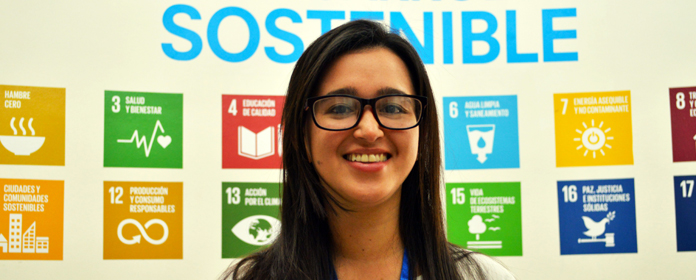MICS graduate researches policies against violence against women in El Salvador
Marcela Pleitez combines her work as a gender analyst at the United Nations Program for the development and collaborates with the Technological University of El Salvador.

PHOTO: Courtesy
Marcela Pleitez, a graduate of the first promotion of Master's Degree in research in Social Sciences (MICS) at the University of Navarra, works for the United Nations Program for the development (UNDP) as a gender analyst. Specifically, she focuses on the regional project of InfoSegura 'management of evidence-based information for citizen security in Central America and the Dominican Republic'.
In it, Pleitez contributes to improving the capacity of national institutions in the collection, analysis and dissemination of data on gender-based violence. It aims to "improve the political decision-making process and implement action plans and pilot programs that build safe and cohesive societies where women can enjoy a life free of violence," she explains. It also facilitates "the articulation between the governments of the region for the implementation of peace and citizen security strategies," he adds.
The Salvadoran not only dedicates her time to work InfoSegura, but also collaborates with the Technological University of El Salvador in the development of a book on the models development implemented in the country throughout history. According to him, this publication will help "students and readers in general to understand how and why we face the challenges of the present".
Beyond the dataMarcela attended MICS in 2016-2017, after having worked for five years as researcher in other agencies of the United Nations System - such as the United Nations Children's Fund (UNICEF) and the Economic Commission for Latin America and the Caribbean (ECLAC) -.
"The Master's Degree taught me to use qualitative methodologies to dig into reality; to listen to people, to analyze their stories to answer my questions from research, and, above all, to discover what is hidden behind the numbers," she says. It has helped me," she adds, "to look beyond numbers and quantitative analysis.
Along these lines, she comments that her current professional responsibilities require her to put on internship the research techniques she learned at Master's Degree. Specifically, they are proving very useful for her current research : the detection of types and characteristics of violence affecting women in Central America and the Dominican Republic. This work will constitute a chapter of a regional UNDP report , graduate 'The hidden face of insecurity: violence against women in Central America and the Dominican Republic'.
In this sense, Pleitez admits that statistics and econometric analyses are very useful but they go further when accompanied by qualitative techniques: "On many occasions, economic and social phenomena (such as poverty and violence) are influenced by variables that are not necessarily shown in econometric models, because they are complex to measure numerically". Among them, he highlights resilience or social cohesion.
Marcela keeps a fond memory of her time at the Institute for Culture and Societywhich coordinates the Master's Degree, not only for the training, but also for the experience of living in another country and meeting people from different places and disciplines. "It seems that the world makes more sense when everyone puts their piece to fill in a puzzle, because everyone brings a different perspective that helps you financial aid to better understand reality," she concludes.
